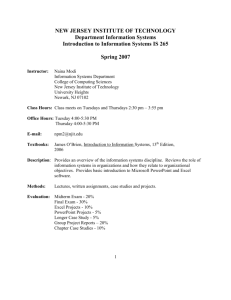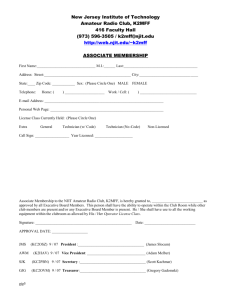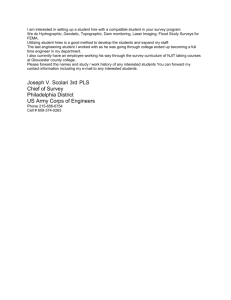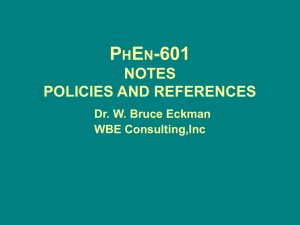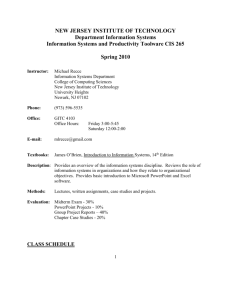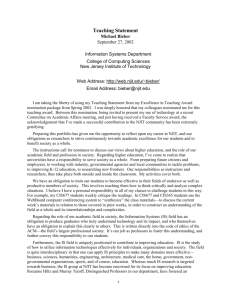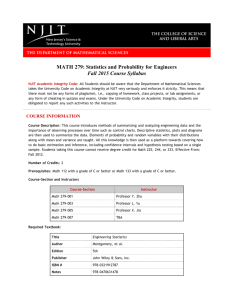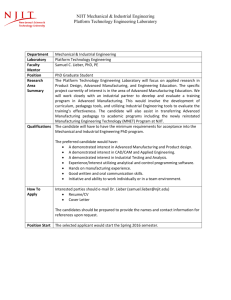ChE624 – Transport Phenomena Spring 2016 Otto H. York
advertisement
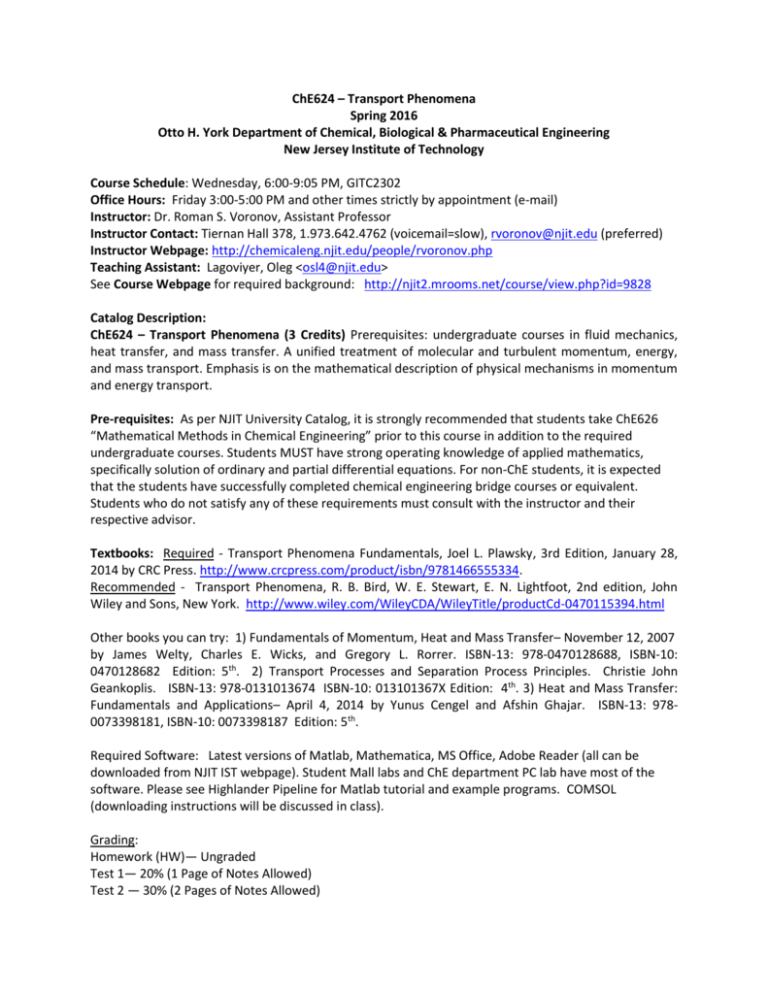
ChE624 – Transport Phenomena Spring 2016 Otto H. York Department of Chemical, Biological & Pharmaceutical Engineering New Jersey Institute of Technology Course Schedule: Wednesday, 6:00-9:05 PM, GITC2302 Office Hours: Friday 3:00-5:00 PM and other times strictly by appointment (e-mail) Instructor: Dr. Roman S. Voronov, Assistant Professor Instructor Contact: Tiernan Hall 378, 1.973.642.4762 (voicemail=slow), rvoronov@njit.edu (preferred) Instructor Webpage: http://chemicaleng.njit.edu/people/rvoronov.php Teaching Assistant: Lagoviyer, Oleg <osl4@njit.edu> See Course Webpage for required background: http://njit2.mrooms.net/course/view.php?id=9828 Catalog Description: ChE624 – Transport Phenomena (3 Credits) Prerequisites: undergraduate courses in fluid mechanics, heat transfer, and mass transfer. A unified treatment of molecular and turbulent momentum, energy, and mass transport. Emphasis is on the mathematical description of physical mechanisms in momentum and energy transport. Pre-requisites: As per NJIT University Catalog, it is strongly recommended that students take ChE626 “Mathematical Methods in Chemical Engineering” prior to this course in addition to the required undergraduate courses. Students MUST have strong operating knowledge of applied mathematics, specifically solution of ordinary and partial differential equations. For non-ChE students, it is expected that the students have successfully completed chemical engineering bridge courses or equivalent. Students who do not satisfy any of these requirements must consult with the instructor and their respective advisor. Textbooks: Required - Transport Phenomena Fundamentals, Joel L. Plawsky, 3rd Edition, January 28, 2014 by CRC Press. http://www.crcpress.com/product/isbn/9781466555334. Recommended - Transport Phenomena, R. B. Bird, W. E. Stewart, E. N. Lightfoot, 2nd edition, John Wiley and Sons, New York. http://www.wiley.com/WileyCDA/WileyTitle/productCd-0470115394.html Other books you can try: 1) Fundamentals of Momentum, Heat and Mass Transfer– November 12, 2007 by James Welty, Charles E. Wicks, and Gregory L. Rorrer. ISBN-13: 978-0470128688, ISBN-10: 0470128682 Edition: 5th. 2) Transport Processes and Separation Process Principles. Christie John Geankoplis. ISBN-13: 978-0131013674 ISBN-10: 013101367X Edition: 4th. 3) Heat and Mass Transfer: Fundamentals and Applications– April 4, 2014 by Yunus Cengel and Afshin Ghajar. ISBN-13: 9780073398181, ISBN-10: 0073398187 Edition: 5th. Required Software: Latest versions of Matlab, Mathematica, MS Office, Adobe Reader (all can be downloaded from NJIT IST webpage). Student Mall labs and ChE department PC lab have most of the software. Please see Highlander Pipeline for Matlab tutorial and example programs. COMSOL (downloading instructions will be discussed in class). Grading: Homework (HW)— Ungraded Test 1— 20% (1 Page of Notes Allowed) Test 2 — 30% (2 Pages of Notes Allowed) Individual Term Project — 30% Final Exam — 20% (3 Pages of Notes Allowed) Moodle Site: http://moodle.njit.edu – Please check this site and your email often. Most of the homework, quizzes and test solutions will be on this site, as well important course announcements. Final letter grades will be awarded based on your weighted average score (see weighting above). Target grade cut-offs are below. These can be loosened at the discretion of the instructor at the end of the semester. 90-100 85-89 80-84 75-79 70-74 <69 A B+ B С+ С F Rounding of grades will be performed by the Excel “round” function to maintain objectivity. There may be a gray area between each two letter grades in the final distribution, so that two students getting similar weighted average, at the border of grade categories, could get different letter grades. If you are in one of these gray areas, whether you get the higher or lower grade depends on whether your performance has been improving or declining over the course period and on your overall class participation (attendance/discussion etc.). Important Dates (Tentative). Please mark on your calendar: Test 1 — TBA Test2 — TBA Individual Term Project — Project report and computer files must be handed in as both hardcopy and ecopy, by the beginning of the reading days. Can’t pass the course if you fail the project. Final Exam —TBD by Registrar Important University Dates (Add/Drop/Refund/Last Day to Withdraw/Recess/Finals): http://www.njit.edu/registrar/calendars/ http://www.njit.edu/registrar/exams/finalexams.php Make-up sessions — If classes are cancelled due to inclement weather, students will be asked to attend make-up session(s) on a Saturday (TBA). Class Attendance: As for all graduate courses at NJIT, attendance is not mandatory, but strongly recommended. Experience shows that students who do not regularly attend class typically perform poorly in the course. In addition, examples are worked out during the lectures. These examples are may not be posted online. Students are responsible for all material covered in class. Office Hours Attendance: This time is for you to come and seek help in case you don’t understand the material, have an English problem, or are concerned about your grade. Coming to office hours shows that you care about learning and positively affects both your performance and evaluation. Do not wait until the very end to do this! Seating Chart: The instructor reserves the right to assign seating during the class lecture. NJIT Honor Code: The NJIT honor code is being upheld on all issues related to the course. Students are expected to be familiar with the code and conduct themselves accordingly. Course Objectives: This core chemical engineering course is essential to the preparation of professional chemical engineers. All subsequent courses and M.S./Ph.D. research will assume competency in the concepts and the problem-solving approach covered in this course. By the end of the course you should learn and understand: - the unified treatment of heat, mass, and momentum transport using a balance equation approach - balance equations in the context of diffusive and convective transport (input, output, accumulation, generation) - derivation and use of microscopic and macroscopic transport equations (ordinary and partial differential equations) - momentum, Bernoulli, energy, and species continuity equations, and their application to heat exchangers, continuous contactors, and chemical reactors - the three fundamental transport coefficients: the friction factor, the heat transfer coefficient, and the mass transfer coefficient in the context of boundary layer theory - basics of radiative heat transfer, including concepts such as blackbodies, graybodies, radiation shields, and enclosures - the use of modern software for computer modeling of transport problems Topics Covered Class Overview, Supercomputing and Atomistic Modeling Methods Ch1: Introductory Concepts Ch2: Flows, Gradients, and Transport Properties Ch3: Transport Properties of Materials Ch4: 1-D, Steady-State, Diffusive Transport Ch5: Generation Ch6: Accumulation Ch8: Transport Enhancement Using Extended Surfaces Ch9: Multidimensional Effects, Potential Functions, and Fields Ch10: Convective Transport: Microscopic Balances NOT IN THE BOOK: Numerical Methods in Transport NOT IN THE BOOK: Multi-Physics Modeling in COMSOL® NOT IN THE BOOK: Dimensional Analysis (If time allows) Policies and Expectations about Exams/Grades A letter grade is based on the weighted average score, a table of average score-letter grade categories, and the office hours attendance record. Letter grade will be assigned and rounded automatically by an Excel code (no emotions attached) in view of the attendance record. The assigned letter grade is FINAL without subject to negotiation! Students have to plan, study and do well in exams/HW if they want to get a good grade in this class. Instructor will NOT change letter grades to accommodate any special circumstances. The student will get the letter grade he/she deserves. Students can dispute the exam scores within a week following the announcement of the score. Students cannot dispute their prior exams or HWs after one week or at the end of the semester! After first review of the dispute, if the score is not modified, but the student is unconvinced and asks for an additional review, then he/she assumes the possibility of instructor removing points as well as giving points. Most important: Have lots of fun!
